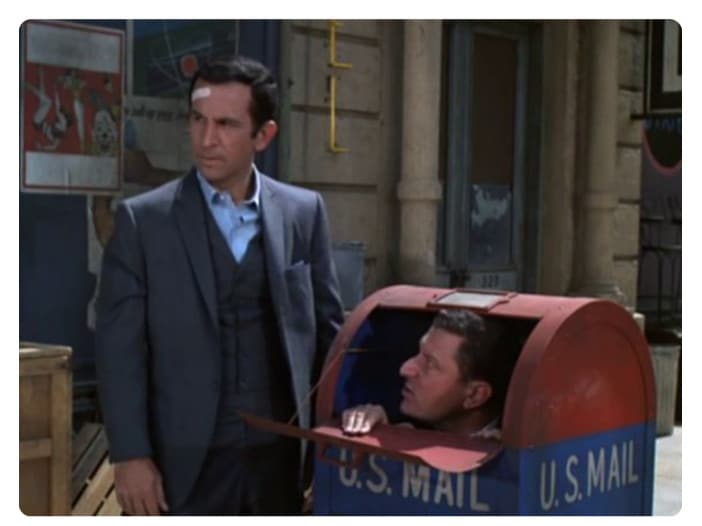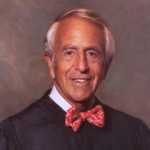
In the 1960’s comedy television series “Get Smart”, Agent 13 was a Government agent whose job was to perform surveillance upon an evil international organization known as “KAOS.” To spy on “KAOS”, Agent 13 would hide inside uncomfortable places, such as a cigarette machine, mailbox, locker, washing machine, trashcan, toilet, tree, or fire hydrant.

Nowadays with advances in technology Government agents don’t have to hide themselves in unsuspecting places to perform surveillance. An example of the Government’s current surveillance tactics can be seen in a recent case from the federal district court in San Francisco.
In U.S.A. v. Giraudo, five Defendants were accused of conspiring to restrain competition by rigging bids at public real estate auctions.
To understand this case, you need to know that when a person or business defaults on a mortgage, the property in question may be sold at a public auction. The proceeds from the auction are used to pay off the bank that holds the mortgage, with the remaining proceeds, if any, paid to the person or business that defaulted on the loan.
However, in this case, the Government alleged that before the auctions, the five Defedants would pick the winning bidder for the property amongst themselves, and then the winning bidder would pay the losing bidders off for keeping their bids low. This practice is illegal because it lowers the sale price of the property, which essentially steals money from the bank holding the mortgage, as well as the person or business being foreclosed upon.
During the Government’s investigation, FBI agents planted listening devices outside the entrance of a county courthouse where the auctions took place. The FBI did not get a warrant (permission) from a judge to plant the listening devices – they just did it on their own.
The listening devices were hidden in a metal sprinkler box, a planter, and an automobile. The FBI turned these devices on at least 31 times and captured over 200 hours of conversations. The devices were so sensitive that they were able to capture not only the voices of people standing in front of the courthouse talking on their cellphones, but also the voices of the persons on the other side of the line. The listening devices did in fact capture incriminating conversations amongst the Defendants, which supported the Government’s case.

The Defendants’ attorneys filed motions to suppress the recordings, claiming that the FBI violated the Fourth Amendment of the United States Constitution when it failed to get a warrant before it eavesdropped on their conversations.
The Fourth Amendment states:
The right of the people to be secure in their persons, houses, papers, and effects, against unreasonable searches and seizures, shall not be violated, and no warrants shall issue, but upon probable cause, supported by oath or affirmation, and particularly describing the place to be searched, and the persons or things to be seized.
The United States Supreme Court has held that the Fourth Amendment not only protects places, but also a person’s communications. However, the Fourth Amendment does not protect every communication a person makes. In the San Francisco case, Federal District Court Judge Charles Breyer, whose brother is Supreme Court Judge Stephen Breyer, noted that the Fourth Amendment would protect the conversations that took place in front of the courthouse only if:
- The defendants had a “subjective expectation of privacy” in their conversations in front of the courthouse.In other words, the defendants had to have thought that their conversations were private.
- The defendants’ expectation that their conversations were private was “objectively reasonable.” In other words, the defendants’ beliefs that their conversations were private had to have been reasonable.
The Government’s lawyers argued that the FBI did not need to get a warrant from a judge because the recorded conversations took place in front of the courthouse – which is a public place. Therefore, the Government argued that the defendants did not have a reasonable expectation of privacy and the Fourth Amendment does not apply.
The Defendants’ attorneys disagreed. They argued that people often have a reasonable expectation of privacy in public places. For example, people in public places often move off the side away from other people to talk in private, or they may lower their voices so other people won’t hear them.
After reviewing the facts of the case, Judge Breyer analyzed whether the Defendants had a “subjective expectation of privacy” and if so, whether or not that expectation was “objectively reasonable.”

First, Judge Breyer noted that the video and audio recordings showed that one of the defendants would keep a close eye on the people near him, speak in a lower voice or stop talking when strangers approached, and generally do everything possible to make sure nobody else heard his conversations. Therefore, Judge Breyer felt that the defendants had a subjective expectation of privacy in their conversations. In other words, the defendants thought what they were saying was private.
Second, to determine whether or not the defendants’ subjective expectations of privacy were objectively reasonable, Judge Breyer considered a variety of factors, including: the location of the conversations; whether the conversations could be overheard with the naked ear; whether the conversations took place out in the open; whether the conversations involved business or private matters; the proximity of other individuals to overhear the conversations; the affirmative actions taken by the speakers to shield their privacy; the need for technological enhancements to hear the communications. After considering all these factors, Judge Breyer found that it was reasonable for the Defendants to have believed that their conversations were indeed private.
Having determined that the Defendants had a subjective expectation of privacy in their conversations in front of the courthouse and that that expectation was objectively reasonable, Judge Breyer ruled that the FBI had violated the Fourth Amendment’s prohibition against unreasonable searches when it recorded the Defendants’ conversations without a warrant. Therefore, Judge Breyer suppressed the recordings. The effect of Judge Breyer’s order was that the Government could not use the recordings as evidence at the Defendants’ trial.
However, it appears that even without these recordings, the Government had enough evidence to convict the Defendants, and all 5 Defendants ended up pleading guilty. Their sentences ranged from probation, to 15 months of incarceration.
For a comprehensive insight into the repercussions of law enforcement practices that contravene the U.S. Constitution, explore further.
Posted in Criminal Procedure
